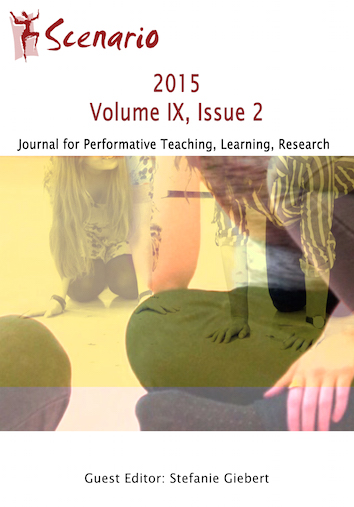Incorporating theatre techniques in the language classroom
DOI:
https://doi.org/10.33178/scenario.9.2.8Abstract
The following workshop was presented at a Foreign Language and Drama Conference at the University of Reutlingen on July 10, 2015. It outlines the use of improvisational theatre techniques in the foreign language classroom by making parallels between the communicative approach to language learning and improvisational theatre techniques learned in various books read and seminars attended by the author throughout the years in numerous cities, but predominantly with Second City Chicago1, iO Chicago2, Keith Johnstone, and Comedy Sportz3. As Friederike Klippel states, “activities are invented, but we rarely know who invented them. Like games or folk songs they are handed on from teacher to teacher” (Klippel 1985: 1). Similarly improvisational activities morph over time, with each teacher adding his or her own personal flair. The seminar is built predominantly on the games and philosophies as outlined by theatre practitioners Augusto Boal, Viola Spolin and Keith Johnstone, but from the viewpoint of the author. While these activities can be used for a variety of purposes with native and non-native English speakers in a number of areas, the focus in the following is on the second language learner. The generally-accepted understanding of a communicative approach to language learning is that it focuses ...References
Almond, Mark (2005): Teaching English with Drama. How to use drama and plays when teaching – for the professional language teacher. Hove: Keyways Publishing
Boal, Augusto (2002): Games for Actors and Non-Actors. Second Edition. London: Routledge
Boal, Augusto (1985): Theatre of the Oppressed. New York: Theatre Communication Group
Johnstone, Keith (1999): Impro for Storytellers. London: Routledge
Klippel, Friederike (1985): Keep Talking: Communicative Fluency Activities for Language Teaching. Cambridge: Cambridge University Press
McKnight, Katherine & Scruggs, Mary (2008): The Second City Guide to Improv in the Classroom: Using Improvisation to Teach Skills and Boost Learning. San Francisco: Jossey-Bass
O'Neil, Cecily & Lambert, Alan (1982): Drama Structures. A practical handbook for teachers. London: Hutchinson
Richards, Jack (2006): Communicative Language Teaching Today. Cambridge: Cambridge University Press
Rinvolucri, Mario (1984): Grammar Games. Cognitive, affective and drama activities for EFL students. Cambridge: Cambridge University Press
Sims, David, Fineman, Steven, Yiannis, Gabriel (1993): Organizing and Organizations : an introduction. London: Sage Publications
Spolin, Viola (1999): Improvisation for the Theatre. Third Edition. Noyes St. Evanston: Northwestern University Press
Swados, Elizabeth (2006): At Play: Teaching Teenagers Theater. London: Faber and Faber
Way, Brian (1967): Development through Drama. London: Longman
Published
Issue
Section
License
Copyright (c) 2015 the author(s)

This work is licensed under a Creative Commons Attribution-NonCommercial-NoDerivatives 4.0 International License.



